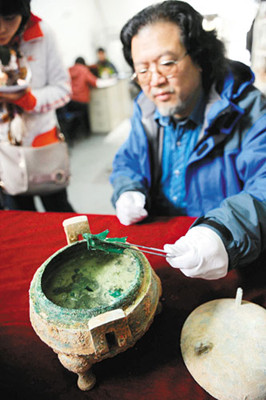
Chinese archaeologists believe they have discovered a 2,400-year-old pot of soup, sealed in a bronze cooking vessel and dug up near the ancient capital of Xian, state press said yesterday.
国家新闻昨日报导,中国考古学家在古都西安发现一锅两千四百年前,放在青铜制烹煮器具的汤。
"It's the first discovery of bone soup in Chinese archaeological history," the Global Times quoted Liu Daiyun of the Shaanxi Provincial Institute of Archaeology as saying.
《环球时报》引述陕西省考古研究所的刘呆运表示,“这是中国考古史上首次发现骨汤。”
"The discovery will play an important role in studying the eating habits and culture of the Warring States Period (475-221 BC)."
“这项发现将有助于了解战国时代(西元前四百七十五到二百二十一年)的饮食习惯与文化。”
The soup and bones were discovered in a small, sealed bronze vessel in a tomb being excavated to make way for the extension of the airport in Xian, home to the country's famed ancient terracotta warriors, the report said.
报导表示,这锅汤与骨头发现于一座墓穴被封住的青铜制容器中。该墓穴是因为西安机场扩建工程开挖而被发现。西安就是以发现兵马俑而著称。
The liquid and bones in the vessel had turned green due to the oxidation of the bronze, it said. Scientists were expected to conduct further tests to confirm the liquid was indeed soup and to identify the ingredients.
报导说,内部液体与骨头因为铜锈而变绿色。科学家将进一步研究,确定这个液体的确为汤,并找出制作汤的原料。
Archaeologists also dug up another bronze pot that contained an odorless liquid, believed to be wine, in the tomb, which could belong to either a member of the land- owning class or a military officer, the report said.
考古学家也自墓穴挖出另一具装过无味液体的青铜罐子,他们认为可能是放在坟墓里的酒。该坟墓曾属于地主级人物,或者军官。
Xian, a city that served as China's ancient capital for over 1,100 years, is famed for the terracotta army at the burial site of Qin Shihuang, who presided over the unification of China in 221 BC and declared himself the first emperor.
西安曾经长达一千一百年为中国首都,因秦始皇于该处埋了兵马俑而著名。秦始皇于西元前二百二十一年统一中国,并自称皇帝。
词汇点津:
archaeologist 考古学家
archaeological 考古的
dig up 挖掘
excavate 挖掘
terracotta warriors 兵马俑
oxidation 氧化
unification 统一











